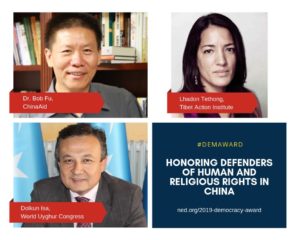For the second time this week, Speaker of the House Nancy Pelosi has called attention to China’s repression of Uyghurs, including the detention of more than 1 million people, deeming the situation a “challenge to the conscience of the entire world,” Newsweek reports:
Uyghurs, a mostly Muslim ethnic minority group that have long been oppressed in China, have suffered increasing human rights abuses in recent years. Since 2016, officials have turned the northwest region of Xinjiang into an effective police state, monitoring and controlling Uyghurs and other ethnic minorities in what is widely seen as an attempt to stamp out religious and foreign influences officials believe could undermine the Chinese Communist Party.
This includes more than 1 million people being sent to “concentration camps” where, the U.S. State Department says, there have been reports of torture and “instances of sexual abuse and death.” Those outside the camps can disappear into the camp system for transgressions as vague as having a beard, buying a SIM card or speaking to family overseas.
 The Holocaust was not widely known when it was happening, which was why the late historian Walter Laqueur’s book was called The Terrible Secret, notes Carl Gershman, President of the National Endowment for Democracy.
The Holocaust was not widely known when it was happening, which was why the late historian Walter Laqueur’s book was called The Terrible Secret, notes Carl Gershman, President of the National Endowment for Democracy.
The knowledge of the concentration camps in East Turkestan has focused more attention on the Uyghur issue than ever before. There has been a dramatic change in attitudes toward China, as we saw the other evening when Speaker Nancy Pelosi announced that a House resolution remember the Tiananmen Square massacre and called for human rights in China passed unanimously. The issue of support for democracy in China is completely bipartisan, as is support for the rights and survival of the Uyghur people, he told today’s conference, “Confronting Atrocities in China: The Global Response to the Uyghur Crisis,” organized by the World Uyghur Congress and the Uyghur Human Rights Project;
We need to take advantage of this and build an international coalition to defend the human rights of the Uyghur people. It should have a number of objectives, Gershman added:
 To raise the general awareness of the concentration camps and the attempt by the Chinese government to commit cultural genocide against the Uyghur people;
To raise the general awareness of the concentration camps and the attempt by the Chinese government to commit cultural genocide against the Uyghur people;- To end the deafening silence in the Muslim world. We can do that by mobilizing our many networks of civil society activists throughout the Muslim world;
- To target companies that are doing business in Xinjiang. One example is Volkswagen, a German company that had a close relationship with the Nazi regime and whose former CEO Herbert Diess said that he was “not aware” of the concentration camps in Xinjiang. There are also 53 Fortune 500 U.S. companies operating in Xinjiang, among them Exxon Mobil, Amazon, General Motors, Ford, General Electric, and Boeing. We can work with trade unions and also business associations to let these companies know that they shouldn’t be operating in a region where the Beijing regime is committing cultural genocide against the native population.
 We need to raise this issue of cultural genocide and the concentration camps in the context of China’s hosting of 2022 Winter Olympics. Companies like Adidas, Nike, Coca Cola need to be told that they shouldn’t sponsor these games while the Beijing regime is holding three million Uyghurs in concentration camps and committing cultural genocide. Human Rights Watch is already on top of this issue and we need to work with them.
We need to raise this issue of cultural genocide and the concentration camps in the context of China’s hosting of 2022 Winter Olympics. Companies like Adidas, Nike, Coca Cola need to be told that they shouldn’t sponsor these games while the Beijing regime is holding three million Uyghurs in concentration camps and committing cultural genocide. Human Rights Watch is already on top of this issue and we need to work with them.- We also need to pressure the International Red Cross to insist on access to Xinjiang to find out what is happening in the concentration camps; and
- As Congressman Jim McGovern just said, there needs to be legislation like the Uyghur Human Rights Policy Act that requires our government to produce reports on the crackdown and its national security implications, calls for the appointment of a Special Coordinator for Xinjiang, and recommends the application of Magnitsky targeted sanctions against Chinese officials who are involved in the atrocities being committed against the Uyghur people.







